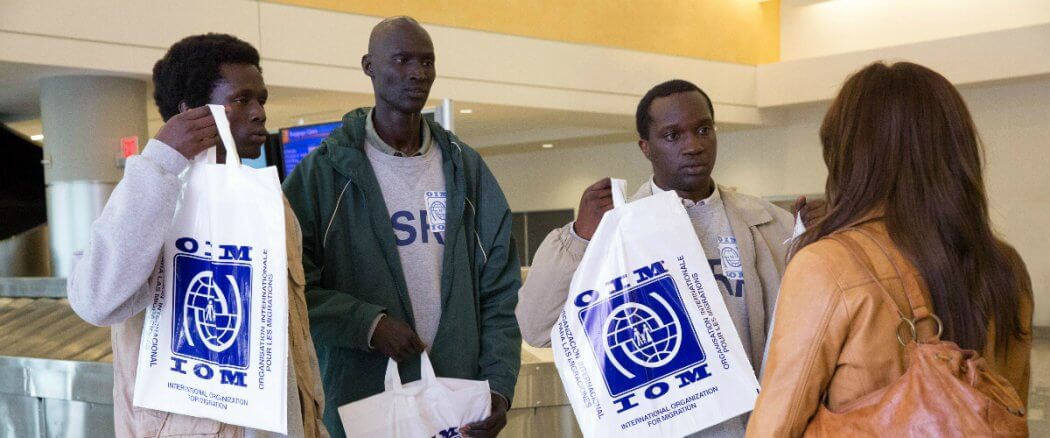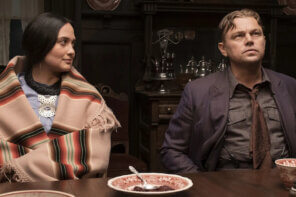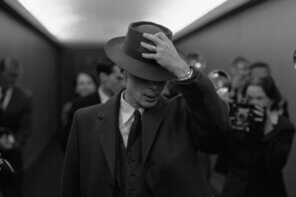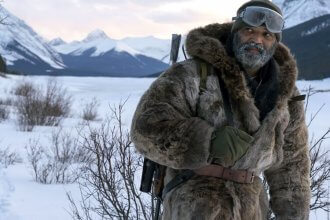In 1983 a civil war broke out in Sudan between the North and South regions. This was settled, but then followed by a second civil war in 1987. More than 2 million people have died in this conflict but, like so much war in the world today, the stories of human tragedy and suffering are buried on the back pages of our news sources, if covered at all. Many people alive today do not remember when this poor African nation was not embroiled in indiscriminate killing and a policy of starvation as a means to an end.
In 2014 the movie The Good Lie was released billing Reese Witherspoon as its star. It was produced by the talented team of Ron Howard and Brian Glazer who have so many successful films to their credit as either producers and/or directors (including Parenthood, Apollo 13, A Beautiful Mind, Cinderella Man, The Da Vinci Code and this fall’s much anticipated Inferno). It was expected to be a blockbuster but, unfortunately for the film, it opened at the same time as Gone Girl and disappeared from the theaters with barely a whimper. Despite fairly good reviews, many people that I mention the film to have no memory of it. It was said that it was “too soft” to appeal to the young movie-going body, that it had a confusing title, and that it told a story about which few were interested.
The Story and the Script
The “Boys of Sudan” is the colloquial name given by aid workers to over 40,000 young men who attempted to escape the Second Sudanese Civil War, with only around half of them surviving. These thousands of young men, mostly from the Nuer and Dinka tribes, made the long journey across the Sub-Saharan desert, usually with just the clothes on their back and no adult supervision. There were a few girls and adults who also made the journey, but most of them never escaped the destruction of their villages. It was the young boys who were shepherding the family’s livestock outside of the village proper that hid from the murderous soldiers, subsequently running for their lives. They then began their long trek, lasting anywhere from 4 or 5 months to two years. The 50% death rate was due to disease, dehydration, starvation, exposure, drowning in rivers or by being killed and eaten by lions, crocodiles and other wild predators. In addition they were hunted down by the warring combatants and either shot, hacked to death or recruited as child soldiers.
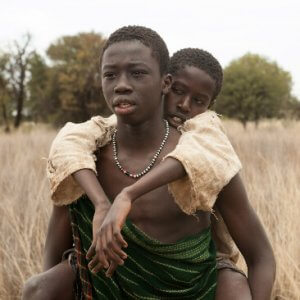 This movie is not a true story per se, but is based on a compilation of many true stories collected by the screenplay author Margaret Nagle, who previously wrote the award winning script for the TV Movie Warm Springs. Years before writing the screenplay about FDR and his wife, she was selling handbags out of the trunk of her car “to make money.” Some of her handbag suppliers were Sudan immigrants. Knowing them stoked her interest in the “Lost Boys (and Girls) of Sudan” and she began to collect everything she could find on them hoping to interest someone in her fledgling script.
This movie is not a true story per se, but is based on a compilation of many true stories collected by the screenplay author Margaret Nagle, who previously wrote the award winning script for the TV Movie Warm Springs. Years before writing the screenplay about FDR and his wife, she was selling handbags out of the trunk of her car “to make money.” Some of her handbag suppliers were Sudan immigrants. Knowing them stoked her interest in the “Lost Boys (and Girls) of Sudan” and she began to collect everything she could find on them hoping to interest someone in her fledgling script.
Her interesting story of how she finally got her script made into this film is told in her own words here. A more in-depth treatment of the convolutions Margaret had to go through is told in this You Tube video of The Good Lie press conference at the Toronto International Film Festival (all the main actors as well as the director and writer are present and for cinephiles it is a very entertaining 49 minute presentation despite — just as a warning — the 3 minute gap between the trailer and the actual press conference).
The Film Is Finally Made
The story of the “Boys” has previously been told in books and documentary films, most notably Lost Boys of Sudan (a documentary film from 2003), God Grew Tired of Us (an excellent documentary film from 2006 followed by a book), and the controversial film Machine Gun Preacher from 2011. But until The Good Lie there was not a major cinematic treatment of the full story of some of these escapees, starting in Sudan and ending in the USA. The director chosen was French Canadian Philippe Falardeau (who previously directed the wonderful and touching movie Monsieur Lazhar). It was upon his insistence that the African characters were played by either true Sudanese refugee actors or their children and also that the film was to have African scenes actually shot in Africa. The authenticity of the film is to his credit, as is the respect and dignity he gives those actors.
Similar to last year’s Room, the movie has two distinct halves, with the first taking place in Africa and the second in Kansas City, Missouri. Opening in a native Dinka village in Sudan, we see children playing while tending to their family’s small herd of livestock. When their village is decimated by a helicopter gunship and rebel soldiers, the children find out their mother and father have been murdered. Five brothers and their sister (aged, I would guess, between 7 and 14) survive. Remembering instructions given them by their “elders,” they began a long trek to Ethiopia which they were told would give them refuge carrying just a few items including a worn Bible.
Led by the oldest boy Theo, who is now “Chief,” they get by with their wits as well as a relentless will to live. Eating meat from animals killed but not yet consumed by larger animals and drinking water from mud holes allows them to survive at first. At risk of dying from dehydration there is a touching scene where Theo has each child recite in turn “I want to live; I do not want to die.” and then drink from a container of Theo’s urine. They walk slowly due to the young and ill, but cling together following the African proverb “If you want to go fast, go alone; if you want to go far, go together.”
Making It to Kakuma
They eventually meet with others, most importantly the brothers Jeremiah and Paul. The brothers are attracted to Theo’s group by their Bible. And Paul knows how to find water by poking a long, hollow straw in an appropriate location. By pooling their resources and knowledge the majority survive until one night, while sleeping in the tall grass, Mamere stands to stretch and immediately sees soldiers walking through the field. He ducks back down in the grass but Theo realizes as the soldiers run towards them that they will discover the entire group. Acting quickly, he gives himself up to the soldiers telling them he is alone and thereby saving the others.
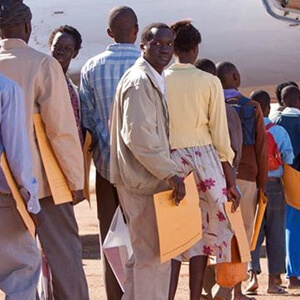 This sacrificial loss of Theo is a central point of the movie with the remaining “tribe” being devastated. Mamere (an earnest and believable Arnold Oceng), as the next oldest boy assumes the role of chief. Eventually five of the children survive and reach Kakuma Refugee Camp in Kenya, but one quickly succumbs to his dehydration and exposure. The rest (three boys – Mamere and the brothers Jeremiah and Paul, as well as Mamere’s sister Abital) put their names on the almost endless list of the camp’s displaced hoping to be accepted by other countries as refugees.
This sacrificial loss of Theo is a central point of the movie with the remaining “tribe” being devastated. Mamere (an earnest and believable Arnold Oceng), as the next oldest boy assumes the role of chief. Eventually five of the children survive and reach Kakuma Refugee Camp in Kenya, but one quickly succumbs to his dehydration and exposure. The rest (three boys – Mamere and the brothers Jeremiah and Paul, as well as Mamere’s sister Abital) put their names on the almost endless list of the camp’s displaced hoping to be accepted by other countries as refugees.
For seven years the four live in the barely sustenance conditions of Kakuma but then the now young adults finally receive the long awaited news that they will be allowed to enter America… the realization of a dream they could barely imagine. As they board the prop plane that will take them away from the camp, Abital tells Mamere, “Now we can finally find out what this means” pointing to the “Just Do It” slogan on the tee shirt Mamere has worn since his arrival in the camp. Even though this second part of the movie is missing the life and death adventures and drama of following the group through their trials in Africa (along with the fantastic cinematography by Ronald Plante), this portion of the movie looks at America through the eyes of four young people with almost completely different values than most Americans have.
A Dream Realized
The trip to the US starts off badly for the boys when the four arrive in New York only to find that Abital will not be allowed to stay with them as INS rules require all women to be separated from the Sudanese men. The men are shocked and angry at bewildered Mamere that he “could allow this to happen.” The disconcerted boys arrive at the Kansas City airport with no idea who is to pick them up as communication on the US end was mishandled.
At this point (almost half the way through the movie) the wonderful Reese Witherspoon makes her appearance. An Academy Award winner for Walk the Line and nominated for Wild as well, she accepted a lesser role in this movie at a reduced salary (usually she is paid around $15 million per role) due to her passion for the subject matter. Reese’s character Carrie, who works for an agency that is to find them jobs, is called to pick them up and she rolls out of a bed occupied by a “weekly” boyfriend aggravated that she has to be the one to rescue them. Far from a perfect role model, she arrives to pick them up in a miniskirt and western boots looking frazzled and long after the baggage pickup area is empty (the boys have no baggage anyway). She is wholly unprepared for their naiveté and total dependence on her. In fact, her initial introduction is “Hi… Hey… You must be the guys from…. Somolia?… Senegal? I’m sorry, help me out here.” “Sudan” says a doubting Mamere. Eventually they come to understand each other, with Mamere telling her how much he respects her “survival skills” that she has been able to survive as a single adult woman in her “village.” The boys name her “Yardi” and she smiles wryly when she finds out that the name is Dinka for “Great White Cow,” a title of much respect.
The look of wonder and confusion on their faces at everything they see (couples kissing in public, a fat man riding by on a mobility cart, telephones, raised beds, toothbrushes and fast food restaurants to name a few) make us realize they really were “strangers in a strange land.” And it only escalates from there, as they are completely befuddled by being placed in a modern apartment to fend for themselves. They miss seeing the sky and the stars. Even the most positive of them, Jeremiah, tells Carrie at one point, ”I miss Sudan.” When Carrie asks why, he replies, “Because in Sudan, we know what a lion looks like.”
Deeper Struggles in America
As the film goes on we realize we have stopped smiling and laughing at them and instead we begin to see how removed from the essentials of life our own society can be when seen through the eyes of the boys. When Jeremiah (former refugee Ger Duany – who steals every scene he is in) and Mamere work in a grocery store they rankle at the owner’s instructions to toss into the garbage food that is outdated rather than give it to the homeless, who they are instructed to chase away from the dumpsters. Their boss says, with American capitalist logic, “Why would I give away food for free when I am trying to sell it?” Jeremiah, the most spiritual of the boys, replies “It is a sin not to give to those in need.” And Paul (former refugee Emmanuel Jal), who is adept with his hands, becomes unpopular with his lackadaisical co-workers when he consistently produces much more piece work than they. He becomes depressed at his life saying “We are in America now. And in America we are nothing.”
 In addition, the boys find that they miss Abital terribly and Mamere takes it as a personal failing that he was powerless to keep her from being taken away from them. This, in addition to his guilt that Theo saved them when it was he who was discovered, continues to nag at his conscience because for the Dinka family is everything. This is made plain when at the beginning of the film we see the boys repeatedly memorizing their family lineage by playing a “game” where the patriarch of one generation after another is named while two boys lay their hands down atop each other’s (similar to putting hands around a bat handle to see who bats first at the start of a kid’s pick-up baseball game). We see the boys do this over and over, even when living in America. The story of how they are reunited with their sister, and the linked story of how Carrie changes the direction of her, until then, self-centered life is engrossing and heart-warming. That story serves as a stimulus that no matter what our age God calls us to live for others and not our own selfish desires.
In addition, the boys find that they miss Abital terribly and Mamere takes it as a personal failing that he was powerless to keep her from being taken away from them. This, in addition to his guilt that Theo saved them when it was he who was discovered, continues to nag at his conscience because for the Dinka family is everything. This is made plain when at the beginning of the film we see the boys repeatedly memorizing their family lineage by playing a “game” where the patriarch of one generation after another is named while two boys lay their hands down atop each other’s (similar to putting hands around a bat handle to see who bats first at the start of a kid’s pick-up baseball game). We see the boys do this over and over, even when living in America. The story of how they are reunited with their sister, and the linked story of how Carrie changes the direction of her, until then, self-centered life is engrossing and heart-warming. That story serves as a stimulus that no matter what our age God calls us to live for others and not our own selfish desires.
Mamere is the most motivated, working extra jobs so he can realize his dream of being a physician (closely paralleling the true story of one of the characters in God Grew Tired of Us). He suffers silently from his guilt about Theo’s loss for much of the film but finds he can talk to Carrie’s boss, Jack, played convincingly by Corey Stoll (Ant-Man, Midnight in Paris). In a tender scene, when he finally admits his grief (PTSD), Jack replies “I was in the Army. I’ve been to war. Most of us were just average guys being faced with unimaginable things; being asked to make choices no one should have to make. Your brother made a choice that night. It wasn’t your choice. You didn’t have that power. You never did.”
Is There a Good Lie?
In one of his English courses Mamere’s class is asked by his teacher “Having read Huckleberry Finn can anyone tell me what “the good lie” means?” Mamere eventually answers “When (Huck) tells the slave hunter that he has no slaves, his lie… is an unselfish lie. Because it saves Jim. Jim’s freedom means more to Jim than the money he will get for turning him in. So it is a good lie.”
At the end of the film Mamere faces that same dilemma… whether to be deceptive to have something good happen even though it is a lie and, in addition, is very costly to his personal goals and plans. To someone who early on bridled at Jack telling him to exaggerate his past experiences in order to get a job (“Everyone does it… it is not really a lie.”) this becomes a difficult moral dilemma for him.
Christians In Action
The faith community was instrumental in hosting the 3600 refugees from Kakuma who came to the United States. Most of them were sponsored and placed by Faith Based Initiatives. We as Christians can be proud of our faith for that but also stimulated to do it again. Sadly, since 9/11 all refugee flights from Kakuma were canceled until recently. The present climate in this country is a sad transition from that time. As Jeremiah (the character) would say “It is a sin.”
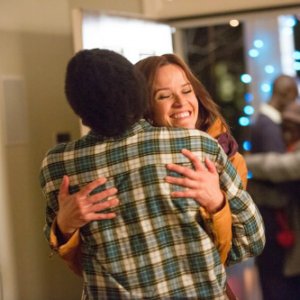 And the Christians in this movie are not portrayed as being stuffy or judgmental. When Carrie calls on a church worker to help her get her house in order the worker rolls up her sleeves and asks if she has anything to drink (meaning a soda). When Carrie thinks for a moment and says “Well… I have tequila” the church worker says with a grin “Praise the Lord!”
And the Christians in this movie are not portrayed as being stuffy or judgmental. When Carrie calls on a church worker to help her get her house in order the worker rolls up her sleeves and asks if she has anything to drink (meaning a soda). When Carrie thinks for a moment and says “Well… I have tequila” the church worker says with a grin “Praise the Lord!”
I love the interweaving of Christianity throughout this film, unusual by today’s Hollywood standards. The dilemmas of guilt and failure, of lying (I have had pastors who argue that even the best intentioned “white” lie is a sin and sets us on the slippery slope), of the isolation of modern society, of not caring if it does not affect us personally… who is better equipped to wrestle with those issues than the faith community? Yet in so many movies the idea of faith helping us deal with those issues is pointedly ignored.
Despite Its Faults, a Film Worth Seeing
This film has so many humorous situations (you will never have your children tell you the “Why did the chicken cross the road” joke again without thinking of the boys) but the mood of the film is skillfully balanced by Falardeau with scenes both moving and dramatically tense. Characters are presented with nobility and complex authenticity. There are a few too many plot lines that go nowhere (we learn that Carrie’s sister died of cancer – was that really necessary?) And, yes, some of the acting might be slightly below Hollywood standards, but some is exceptional (Reese has come a long, long way from Legally Blonde and Penelope, as anyone who has seen Wild could tell you). You could accuse the story of being manipulative but when you think of the more than 54 million refugees in the world with only 17 million being “fortunate” enough to be in refugee camps, maybe we need to be manipulated (view Rick Warren in 2014 talk about this and interview members of the cast and crew here.) And at a time where Syrian refugees are dying daily, when America is becoming increasingly xenophobic, and when Kenya is taking steps to close the Kakuma Refugee Camp (read here) we need, both personally and nationally, to be prodded to do more.
At the end of the movie Jeremiah says from the pulpit “This is the story of my brothers and sisters. When we were children our father say, ‘Let something of me survive.’ We did not even know what does it mean. But then we saw our family murdered and our villages destroyed, and then we understood. We held inside ourselves the memories of our forefathers and their teaching so that we could move forward in the world. Like an invisible bridge, their memory connects our old life with our new… They call us the ‘Lost Boys of Sudan.’ I don’t think we are lost. I think we are found.”
I recommend this movie with enthusiasm as in my opinion it has been sorely overlooked. It moves me each time I see it (I probably have watched it ten times now.) Give it a chance to soften your heart and learn from the (supposedly) unlearned, showing what is possible when we act on the lessons taught to us by our families and our faith. For its beautiful vistas, its authenticity, its humor, the dignity of its characters, its emphasis on family and community, its emphasis on self-sacrifice, and its prompting for we of faith to consider the plight of the immigrant/refugee… you will be rewarded. (Suitable for all ages from upper grade school up.)
“Lord, when did we see you hungry and feed you, or thirsty and give you something to drink? When did we see you a stranger and invite you in, or needing clothes and clothe you? When did we see you sick or in prison and go to visit you? The King will reply, “I tell you the truth, whatever you did for one of the least of these brothers of mine, you did for me.” Matthew 25:37-40
“Do not neglect to show hospitality to strangers, for thereby some have entertained angels unawares.” Hebrews 13:2
__________________________________________
A fund set up to support those still in the Kakuma Refugee Camp is found here and, of course, for Christians there is always www.worldvision.org and many other faith-based charities that work in the nations struggling with these issues.

